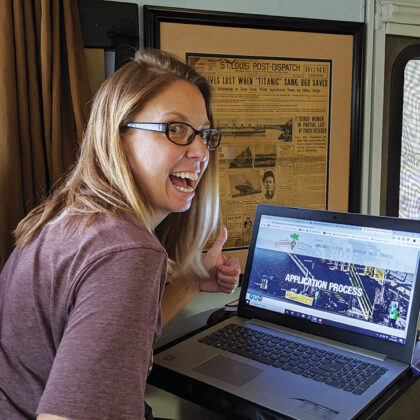The Workamping experience can be frustrating when expectations are not met. The best way to improve expectations is by ensuring you have a very good idea of everything a Workamper opportunity will entail before you and your RV roll in to start a new job.

Article by Greg Gerber
It’s possible that an interview can go very well and a job seem like a perfect match because the employer and Workamper made a great connection over the phone or via webinar. Later, things can sour when one or the other’s expectations aren’t being met.
To prevent that from happening, an initial interview is the ideal opportunity to lay out expectations so you know precisely what will be expected of you on the job, and how you will be compensated for work you provide.
Here is a list of questions you can ask that will deepen your understanding of a job that is being offered to you, as well as the people you’ll be working with that season.
Job Duties
- What are the typical tasks I will perform most days? (Ask the employer to describe how a task is done, step-by-step, so you can form a mental image of what it will take to carry it out. Or, if you have done similar work in the past, describe what you would do to see if it matches the employer’s expectations)
- How much time during a typical day will I spend:
- Standing?
- Walking?
- Lifting heavy objects?
- In direct contact with customers?
- Being around children?
- Working outdoors? What about during inclement weather?
- How frequent are the breaks and how long do they last?
- What would you like me to do during slow periods?
- Am I responsible for handling money?
- Do I supervise other workers? Do I get to hire the people I supervise?
- Is a golf cart provided? Is it available when I’m not working?
- What are examples of “other duties as assigned?” (Most job descriptions include that catch-all phrase. Asking this might give you a better idea of unusual things you may be expected to do.)
Job Hours and Time Off
- What are the minimum and maximum hours I will need to work each week?
- What time will I usually start and end my day?
- Will I be working the hours all at once or on in a split shift? For example, from 9 a.m. to 5 p.m., or from 7 to 10 a.m. AND 4 to 7 p.m.
- Will I need to work every weekend?
- Will I be working during state- and federally-recognized holidays?
- Is it possible to take extended time off for touring or to visit friends and relatives?
- If I ever need to be on-call, what does that entail?
- How is time off scheduled? Are the days off in a row or scattered throughout the week? Do I have specific days off?
- Will I have the same days off as my spouse or partner?
- Will I be scheduled to work the same hours as my spouse or partner? (That would be important if you have to drive to a job site and you share transportation.)
- Will I be paid or able to make up hours if I am unable to work due to bad weather?
- How many hours will I typically work each week? Is overtime available? Is overtime expected?
- Will the time spent working vary throughout the season? For example, are fewer hours required before Memorial Day and after Labor Day?
- What is the policy on family emergencies should I have to leave for a few days?
Work Environment?
- Will I be working mostly indoors or outdoors? If I am unable to work outdoors because of inclement weather, will I be; paid anyhow, able to make up the hours or, paid based on the actual hours worked?
- Who will I be directly reporting to? Will I have an opportunity to speak to that person before making a commitment?
- Are there regularly-scheduled staff meetings or social gatherings?
- Are staff members required to display their preferred pronouns and abide by the wishes of others in referring to those pronouns?
- When do I need to report for my first day? When will the job end?
- What type of training is required or will training be provided?
- Are any special licenses needed, such as a commercial driver’s license or first aid certification?
- Am I required to provide any tools or will they all be provided by the employer?
- How many people will I be working with on a typical day?
- Do I ever need to work alone? If so, how long will I typically be by myself?
- Is smoking allowed?
- Do you have a policy and procedures manual?
- Do the owners or managers live on site?
- Do you seek input from Workampers regarding potential improvements to services offered or workplace policies?
Attire
- Do I have to wear a uniform? If so, how many uniforms will I receive? Will I need to launder the uniforms or pick up a new one every day?
- If uniforms are not required, is there a dress code? (It’s a good idea to describe what you would typically like to wear at work to see if that is acceptable.)
Compensation
Compensation comes in many forms, including hourly wages, a flat salary, RV site in exchange for work hours, or a combination of an RV site with money paid for additional hours. But, don’t forget the perks. They vary depending on the employer and can greatly increase the value of your compensation.
It’s also a good idea to understand the labor laws in the state you will be working. For example, some states exempt seasonal employers from paying overtime.
Some employers offer a stipend to help pay for RV site costs, if an RV site is not provided.
- Am I considered an employee, volunteer or independent contractor?
- If I am paid, is it an hourly rate or a flat salary?
- How often will I be paid and on what day?
- How long is the lag period between the end of a pay period and when I get paid? For example, if a pay period ends on Friday, will you be paid that day or a week or two later?
- Do you automatically deposit money into my account or give me a check?
- What costs are automatically deducted from my check?
- Are bonuses offered? What does it entail? What must I do to qualify to receive a bonus?
- Can my teenagers get jobs, too?
- If an RV site is included in the compensation, is the fair market value reported to the IRS?
- Am I required to live on-site? If so, can I get a written statement outlining the policy? Check with your accountant because there may be income tax consequences. For example, if you are NOT required to live on site and get an RV site as part of your compensation, you may be required to pay taxes on the fair market value of the site. If you are required to live on site, the employer can deduct it as a business expense and you would not be required to claim the value as compensation.
Perks
- Does the company help pay for gas to get to the job site? Is it based on a flat rate or calculated per mile?
- What kind of employee discounts are available?
- Can Workampers enjoy free or discounted use the job’s amenities when they aren’t working, such as a swimming pool, restaurant or use of a boat?
- Is propane or firewood included?
- Do I have a golf cart or other vehicle available to use when I’m not working?
- Do I get any paid vacation days or personal time off?
- Is health insurance available?
- Are Workampers eligible to participate in a company 401K?
- If I am injured on the job, am I covered by worker’s compensation insurance?
Hourly questions
- What is the starting wage?
- Are raises possible? What must I do to qualify for a higher wage? Some companies give increases after a certain time on the job while others may provide a higher wage after completing training on various jobs.
- Is overtime available? Is it expected?
Salary questions
- If I am paid a flat salary, how much is it? How many hours am I expected to put in to earn that salary?
- Will I be paid extra or receive time-off later for exceeding those hours?
- Is the salary paid per person or per couple?
Questions for volunteers or exchanging hours for an RV site
- Is an RV site included in my compensation? If I must pay for the site, how much is it per week or month?
- Are utility connections included in that rate, or are they an extra fee?
- If I am expected to work a certain number of hours in exchange for my RV site, how many hours must I put in?
- Do the required hours apply to each person in the RV or everyone as a group? For example, if an employer requires 20 hours per week in exchange for an RV site, is that 20 hours from each person or 20 hours for the couple/family?
- Can one person do all the work so the other person can get a different job locally?
- If I work beyond the established number of exchange hours, will I get paid for those hours?
- What is the compensation for any additional hours?
RV Site
Many jobs make an RV site available to Workampers, but not all of them are provided at no cost. Some sites come with utility connections, while others require separate payments. Remember, the location of the site may impact your ability to use solar panels or acquire a satellite signal.
- Is an RV site available to me? If so, what will I need to pay weekly or monthly?
- Is the payment automatically deducted from my pay?
- Is the site paved, gravel or dirt? Are the roads into and around the campground paved, gravel or dirt?
- Are water, sewer, electric and internet connections available? What do I need to pay for those services?
- Is the electric 20-, 30 or 50-amp power? Is the electricity on a loop feed so that a problem with one RV can impact others on the same loop?
- If sewer is not available, is there a dump station nearby or will a honey wagon pump-out service be provided? If so, is there a cost for that?
- How far away are neighboring RV sites?
- Is propane available on site or can it be delivered to my site?
- Can I wash my vehicles on my site?
- Will my site be adequately level or will I need to use blocks and jacks to make it level?
- Is the site long and wide enough to accommodate my rig while having space available for my tow or towed vehicle? (Be sure to include fully-extended slides in calculating width.)
- Are the Workamper campsites mixed in with other campers or in a separate area for employees?
- Where is my RV site located? Is it in the sun or under shade? Is it in a high-traffic area or relatively isolated? Are there trees on the site that could interfere with slideouts, solar or satellite equipment?
- Are the internet connections wireless or hard-wired? Is special equipment required to access the internet?
- Are pets allowed? Are there restrictions regarding specific breeds, number of pets or their size? (If you don’t like pets, consider asking if a no-pet area is available for your rig?)
- Is a picnic table provided on my site? What about a storage shed?
- Are laundry services available on-site? What does it cost?
- Are campfires allowed?
- Is trash picked up on site or do I need to take it to a central dumpster?
- Are there any restrictions about use of decorations, RV siding or other structures, like portable awnings?
- Am I allowed to invite friends or family to stay with me? Is there an added cost?
- Can I run a business from my RV at the site?
- What are the quiet hours and are they enforced?
- Are speed bumps installed in the park? What is the speed limit?
- Are there any restrictions on the age or appearance of RVs allowed in the park?
- Are there any height or weight restrictions on roads leading to the RV park?
Local Area
Many questions pertaining to availability of specific businesses in the local area can be found by searching on Google maps. But, employers can provide a lot of insight into local businesses.
- What are the best restaurants in the local area?
- What entertainment options are available locally, such as movie theaters?
- What activities are available in the local area, especially typical tourist attractions?
- Are there any must-see places to visit in the local area?
- Are there any fairs or festivals scheduled when I’ll be in the area?
- Are there any farmer’s markets in the area and will you have time off to visit them? For example, some may only be operating on Saturday mornings?
- How far away is the nearest Costco?
- How many gas stations are located nearby? Is diesel fuel available?
- How far away is the nearest “big city” (however you wish to define it)?
- What cellular companies provide service to the area? What is the typical signal strength? Is it 4G or 5G speed?
- Is there a hospital, emergency room, urgent care facility, doctor, dentist, medical lab or pharmacy nearby?
- Is there a veterinarian nearby?
- How far away is the nearest home improvement store?
- How far away is the closest train tracks, interstate highway, airport, fire station, dog kennel, gun club or industrial center? (This will help you gauge the frequency and intensity of noise.)
By taking time to get answers to all the questions that are important to you, you will take a big step to ensuring your next Workamping assignment is an enjoyable one. Most employers are happy to answer all the questions potential Workampers want to ask. However, if they are hesitant to provide answers, factor that into your decision to take the job.
Thanks for reading the Gone Workamping blog from Workamper News. Join Workamper.com today to see all the new job opportunities for RVers, as well as the training and resources to confidently find the right Workamping job for you – easily and securely.






